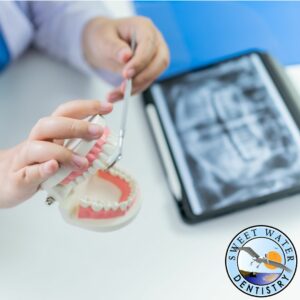What Makes You A Bad Candidate For Dental Implants?
Have you ever wondered whether dental implants are the right choice for you? Picture this: you’ve lost a tooth or two (it happens to the best of us), and now you’re contemplating the path to restoring your smile. Dental implants often come up as a reliable solution, but they’re not suitable for everyone. Understanding what makes you a bad candidate for dental implants can save time, effort, and discomfort
Understanding Dental Implants
Dental implants are small titanium posts inserted into your jawbone. They act like the roots of missing teeth and provide a sturdy base for artificial teeth. The implant fuses with your bone, offering stability for eating and speaking. But, before going ahead, there are several factors to consider.
Why Dental Implants?
Dental implants are popular for their longevity and natural appearance. They don’t slip or shift and require no special care beyond normal brushing and flossing. Sounds like a dream, right? Still, their success depends on a few key factors.
Factors That Make You a Poor Candidate
Not everyone is an ideal candidate for this procedure. Let’s explore the factors that might put you in the “not-so-great choice” category.
Unhealthy Gums and Poor Oral Health
Healthy gums are crucial for supporting dental implants. If you’re dealing with gum disease or general poor oral health, implants might not be ideal. Gum disease can lead to infection around the implant, potentially causing it to fail. Maintaining good oral hygiene is vital, and your dentist can guide you on improving your oral health before considering implants.
Insufficient Bone Density
For an implant to integrate successfully, you need enough healthy bone in your jaw. If you’ve experienced bone loss, often due to tooth loss or gum disease, you might not have enough bone to support an implant. In some cases, a bone graft can help, but this adds complexity and time to the process.
Smoking Habits
Smoking negatively affects the healing process. Nicotine reduces blood flow to the gums, hindering healing and increasing the risk of infection and implant failure. If you’re a smoker, your dentist might recommend quitting smoking before undergoing implant surgery to improve the chances of success.
Chronic Health Conditions
Certain chronic health conditions make you a less ideal candidate. Conditions such as diabetes can affect healing, while autoimmune diseases might interfere with recovery. If you have such conditions, speak with your healthcare provider and dentist about your risks and options.
Heavy Alcohol Use or Drug Abuse
Like smoking, excessive alcohol and drug use can prevent adequate healing. They can obstruct the integration of the implant with your bone, resulting in failure. Being honest with your dentist about your habits helps them ensure you receive the most suitable care.
Age Considerations
Age can also play a role. Implants are typically not recommended for young children or adolescents as their jawbones are still developing. There’s no upper age limit, but your overall health is more important than age alone.
Financial Constraints
Dental implants can be costly compared to other options. If the price is an issue, consider discussing alternative solutions with your dentist. While implants are a worthy investment for many, ensuring you understand your financial obligations is essential.

Improving Your Candidacy
Not all hope is lost if you’ve identified with any of these factors. You can improve many of these conditions to become a better candidate for dental implants.
Enhancing Oral Health
Start by improving your oral hygiene routine. Regular dental check-ups, cleanings, and adopting a thorough brushing and flossing regimen can vastly improve gum health. Address any gum disease before considering implants.
Bone Grafting
For those with insufficient bone mass, a bone graft might enhance your candidacy. Your dentist can discuss whether this procedure is suitable and effective for your situation.
Quitting Smoking
Quitting smoking benefits your oral health significantly and can improve your overall quality of life. Seek support if needed to successfully quit, and potentially improve your eligibility for implants.
Managing Health Conditions
Consult your healthcare provider to manage chronic conditions better. Controlling conditions like diabetes can positively impact your oral health and self-healing abilities, making implants more feasible.
Exploring Alternatives
If dental implants still don’t seem feasible, alternatives are available that might suit your needs better.
Dentures
Dentures are removable appliances that replace missing teeth. They are often a practical and economical choice, even though they might not offer the same stability as implants. Modern dentures fit better and look more natural than ever.
Dental Bridges
Bridges fill the gap of missing teeth by anchoring to adjacent teeth. They can provide a good aesthetic result and help restore typical function without undergoing surgery.
Final Thoughts
Considering that small metal post? Remember that the path to a complete smile involves understanding your circumstances and making educated choices. Identifying what makes you a bad candidate for dental implants allows you to explore alternative solutions with confidence. Sweet Water Dentistry in Fairhope, AL, offers a compassionate and patient-focused environment where you can explore all your dental options. Take the first step to a healthier smile and consult with trusted dental professionals who honor your unique needs.
For more information or to schedule a consultation, reach out to Sweet Water Dentistry at Sweet Water Dentistry or call (251) 210-2773. Discover what makes Sweet Water Dentistry a leader in compassionate and comprehensive dental care.
In the pursuit of the right dental solution, being informed is your greatest ally. Whether you proceed with dental implants or choose another route, prioritizing your oral health and well-being remains a worthy and rewarding endeavor.
So, what’s your next move in reclaiming your best smile?
Visit us for expert care:
Sweet Water Dentistry
📍 5915 Sweetwater Cir, Fairhope, AL 36532
🌐 sweetwatersmile.com
📞 Call or Text: (251) 210-2773
Follow us on Facebook and Instagram for the latest updates and special offers!

